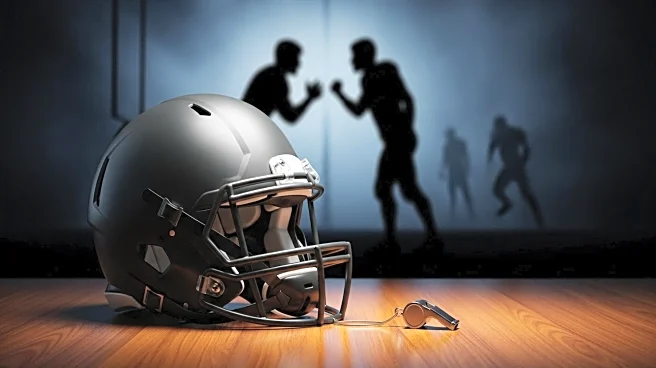What's Happening?
During a highly anticipated college football game between Auburn and Georgia, a controversial fumble call became the focal point of the match. Auburn was leading 10-0 and was on the verge of extending their lead to 17-0 when quarterback Jackson Arnold attempted a 'tush push' play at the goal line. As Arnold approached the end zone, a Georgia defender punched the ball out of his hands, leading to a fumble call by the referees. The decision was met with disagreement from Auburn fans and commentators, who believed Arnold had crossed the goal line before losing control of the ball. The call was reviewed by SEC officials in Birmingham, but the ruling stood, resulting in a shift in momentum as Georgia capitalized on the fumble to score a field goal before halftime.
Why It's Important?
The controversial call has significant implications for both teams. For Auburn, the decision not only affected the outcome of the game but also highlighted ongoing frustrations with SEC officiating. Auburn's head coach Hugh Freeze expressed disbelief at the call, which he felt undermined his team's dominant performance. The incident has sparked discussions about the consistency and accuracy of officiating in college football, particularly within the SEC. For Georgia, the ruling provided a crucial opportunity to regain momentum and ultimately secure a 20-10 victory, preserving their hopes for a successful season despite earlier setbacks.
What's Next?
Auburn faces a challenging path ahead, with upcoming games against ranked opponents Missouri, Vanderbilt, and Alabama. The team is now 0-3 in SEC play, and the pressure is mounting on head coach Hugh Freeze to deliver results. Meanwhile, Georgia will look to build on their victory as they aim for a College Football Playoff berth, with key games against Ole Miss, Texas, and Georgia Tech on the horizon. The controversy surrounding the fumble call is likely to continue, with fans and analysts scrutinizing SEC officiating standards.
Beyond the Headlines
The incident raises broader questions about the role of technology in sports officiating. The reliance on video reviews and pylon cameras during the game highlights the challenges of ensuring fair play and accurate decision-making in high-stakes matches. As debates over officiating continue, there may be calls for further technological advancements or changes in review protocols to enhance the accuracy and transparency of calls.










